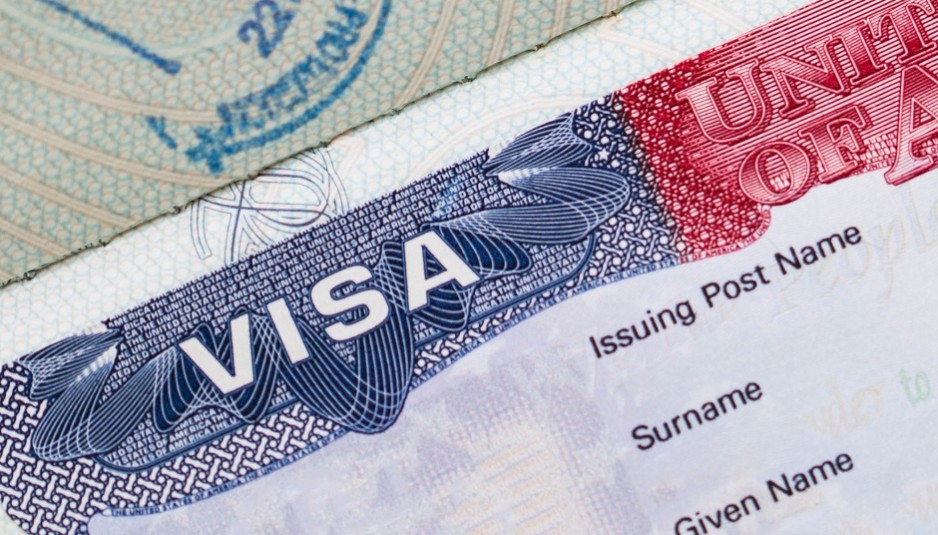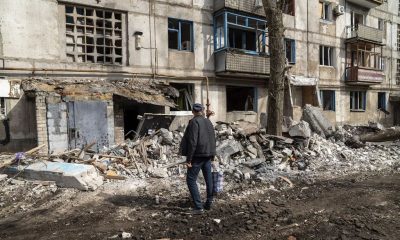International
How war in Ukraine turned Sri Lanka’s economic crisis into a calamity

Life for Hasun Peiris began to unravel a year ago under the pull of powerful forces he didn’t understand.
Climbing food prices drained the 32-year-old woodcutter’s savings, and his family sold their truck. Hunger began to gnaw at their bellies, and they pawned off their gold.
Then, after war erupted thousands of miles away in Ukraine, diesel grew more and more scarce in Sri Lanka, leading to daily power cuts starting last month. Now, Peiris has been forced to scale back his lumber shipments — and his diet. What money he has goes to buying eggs for his pregnant wife.
“I can’t remember the last time I ate chicken or coconut milk,” Peiris said, sitting inside his half-finished house while his five employees idly sorted matchwood in the yard. It was another afternoon wasted, with no electricity or diesel to power his tools and make a living. “I’m afraid,” he said. “I don’t know how to continue.”
Sri Lanka is mired in an unprecedented economic crisis brought on by mostly domestic factors: Years of foreign-debt-fueled government spending, badly timed tax cuts, policies that hurt crop yields and a precipitous drop in tourism during the coronavirus pandemic have hollowed out its foreign reserves.
But Sri Lanka’s teetering finances were dealt another blow this year when war in Europe sent global fuel and food prices surging, turning the small country’s uphill economic struggle into something insurmountable.
READ ALSO:
- U.S., allies plan for long-term isolation of Russia
- ‘Inhuman’ situation in Ukraine’s Mariupol as Russia claims almost full control
- Herdsmen Not Behind Benue Latest Attack – Military
Sir Lanka said Tuesday it needed to suspend international debt payments to save its dwindling dollar reserves for importing fuel and food, both of which are in short supply here, contributing to a devastating inflationary spiral. Over the past six months, central bank data shows, market prices for rice and wheat have doubled.
Diesel prices have shot up 60 percent, leading to widespread shortages and blackouts that have fanned protests across the country demanding President Gotabaya Rajapaksa step down.
“Sri Lanka would be in crisis even if you didn’t have a war in Ukraine, but it’s compounding everything,” said Alan Keenan, an analyst at the International Crisis Group consultancy. “This is the Ukraine effect: a credit line for fuel you thought could last two months now lasts one. Even if you get a bailout, you’re buying less food, less fuel, less medicine.”
“Now,” Keenan added, “is a terrible time to be crashing your economy.”
Last week, the United Nations Food and Agriculture Organization warned that global food prices had risen to the highest level since it began tracking them in 1990, partly due to the war in Ukraine, a major wheat producer. Inflation, the agency’s chief said, will impose “extraordinary costs on global consumers, particularly the poorest.”
As Sri Lanka’s foreign currency reserves fell dangerously in February, the country negotiated a $500 million credit line with India to import oil, which not only powers transportation and industry across the island but also accounts for 40 percent of its electricity generation. That credit line will already be exhausted by this month, said finance minister Ali Sabry, who is seeking more emergency financing from India and other governments.
“Our import bill for essential fuel has almost doubled, particularly with the unfortunate situation in Ukraine,” Sabry said in an interview this week before his ministry announced it would default on nearly $50 billion in foreign loans to prioritize imports.
“Wheat prices have gone up. Freight prices have gone up. It’s all affecting our reserves in a big way,” he said. “Even the United States has high inflation. Everybody is suffering, more or less.”
Growing protests
So far, Sri Lanka’s protests have been mostly made up of young, middle-class professionals who grew up in a decade of relative prosperity, as the nation emerged from decades of civil war, expanded its manufacturing and white-collar jobs, and looked poised to become the next Asian success story.
READ ALSO:
- MNJTF rains multiple missiles on ISWAP Commanders, training camps
- Man, 40, defiles brother’s daughter, gags mouth with pillow
- Man arrested for for ‘stealing’ two children in church
In the past year, these workers have seen their purchasing power and their middle-class futures evaporate. Families gather nightly in places such as the downtown waterfront of the capital, Colombo, to chant slogans against Rajapaska and honk their horns in protest. The atmosphere is festive, but frustration is mounting.
Jay Tissera, a 28-year old graphic designer, took a break from protesting outside the presidential office on a recent afternoon and smoked with his friends — a computer programmer and a journalist — in the shadow of a seaside tower that boasted $1.4 million apartments with sweeping views of the Indian Ocean and interiors designed by a French architect.
“They point to this as development,” Tissera said, pointing up. “But you see, for years the people haven’t developed.”
So far, these demonstrations have been largely peaceful, but officials in both the ruling party and the opposition are worried about where they will lead. They fear a deeper rage could erupt if the poor, who are working overtime just to survive and have not joined the protests en masse, are driven to the streets by hunger.
Eran Wickramaratne, an opposition politician and former state minister of finance, said the government needed to import more food immediately. Last week, India began shipping 40,000 tons of rice to Sri Lanka. But Wickramaratne said it wasn’t enough.
“Those protests are now calm and collected but they might quickly take a different direction,” he said. Wickramaratne shook his head, then waved away the thought. “I don’t even want to imagine it,” he said.
Anger and despair
For many across the capital and on its outskirts, desperation is already setting in.
Outside a busy hospital, Pasinda Fernando, a young pharmacist, confessed with shame and anger that he was beginning to hoard heart medication for his most loyal customers because of a nationwide shortage in imported medicines. “I’m trying my best to reduce prices but the customers are suffering,” he said. “Only when we have a change in government will things get better.”
In another neighborhood, at the front of a line for gasoline that stretched three blocks, K.P. Wimalavathrne, a 61-year old rickshaw driver, said he was eating nothing except five balls of rice noodles a day and sleeping in his back seat. With so much of his time spent waiting for gasoline, “how else can I make money?” he asked, drawing murmurs of sympathy from the crowd of sweaty rickshaw drivers, all of whom had stood for more than two hours to fill up a small jerry can or soda bottle.
Down a coastal road, a group of fishermen were fuming at their elected leader about government officials sneaking into their diesel depot at night to fill up their own vehicles.
Fuel was practically out of reach already, said one of the men, Joseph Anthony Silva. The smaller skiffs lining the pier sit unused, with kerosene unobtainable. Ten-day fishing trips in the bigger boats have been cut to three days because diesel is so expensive, he said. Three meals a day have been cut to two.
Silva fretted about how to feed his family of five and pay loan sharks who he, and other fishermen, are increasingly indebted to as the community has floundered over the past year. Silva owes about $750, or several months’ income, at 20 percent interest, he calculated.
“The loan sharks’ business is so good they’re now open 24 hours a day,” interjected Linton Fernando, another fisherman with growing debts. “They come to our doors and shame us by taking away furniture and gold.”
If fuel and food prices don’t fall, the two men agreed, they would be ruined. As they spoke, a train emerged from a dense palm grove and rumbled across the inlet. Silva nodded toward the barreling locomotive. His mood darkened, his anger folded into despair.
“Soon, there will be no way out of debt,” he said. “No way except death.”
THE WASHINGTON POST
International
Three girls arrested for attempting to stab mother

Three girls arrested for attempting to stab mother
Three teenage sisters in Texas have been charged with trying to stab their mom to death for turning off the Wi-Fi.
The sisters, ages just 14, 15, and 16, were busted after chasing their 39-year-old mother from their Houston home late Sunday allegedly bashing her with a brick and then knocking over their grandmother when she tried to stop them, according to Harris County Sheriff Ed Gonzalez.
“The three siblings allegedly coordinated a plan to try and kill the mother,” Gonzalez wrote on X.
READ ALSO:
- Senator Natasha apologises to Oby Ezekwesili over clash with Nwaebonyi
- Just in: Petitioners insist on Natasha’s recall, submit contact list to INEC [PHOTO]
- My husband likes sex too much, wife seeks divorce
“The mother was struck with a brick” and ” In the process, “the grandmother was knocked over while trying to protect” her, the sheriff said, without further identifying any of those involved.
Luckily, both adults escaped serious injury, he said.
All three sisters were arrested and charged with aggravated assault with a deadly weapon and were booked into the Harris County Juvenile facility.
Three girls arrested for attempting to stab mother
International
Canada removes bonus ranking points for job offers in Express Entry system

Canada removes bonus ranking points for job offers in Express Entry system
Canada’s Immigration, Refugees and Citizenship Canada (IRCC) has announced that, effective March 25th, 2025, bonus Comprehensive Ranking System (CRS) points for job offers will no longer be awarded to Express Entry candidates.
This change will affect both current candidates in the Express Entry pool and future applicants, impacting the path to permanent residence (PR) for many.
Immigration News Canada (INC) cites that the elimination of these bonus CRS points removes a key advantage for candidates with arranged employment.
Previously, candidates could earn up to 200 additional CRS points for senior management positions and 50 points for other skilled job offers.
These points often helped candidates rank higher in the pool and improve their chances of receiving an Invitation to Apply (ITA) for permanent residence. As of March 25th, 2025, this benefit will no longer be available.
READ ALSO:
- Security operatives stop another pipeline bombing in Rivers
- UNN appoints Prof Olayiwola Usman as first Yoruba DVC (Academics)
- Constitution amendment: Reps move to stop gov’ship election cases at A/Court
Details of the policy update
The policy change applies to both existing candidates and those planning to apply after March 25th. Before the change, candidates with a valid job offer supported by a Labour Market Impact Assessment (LMIA) could earn 200 points for senior management positions and 50 points for other skilled jobs.
- These bonus points were instrumental in propelling candidates to the top of the Express Entry pool, increasing their likelihood of receiving an ITA.
However, with the new policy, these additional points will no longer be awarded. IRCC described this change as a “temporary measure” in a press release dated December 23, 2024, but has not provided a timeline for when or if the bonus points will be reinstated.
- The Ministerial Instructions updated on March 25, 2025, keep the definition of a valid job offer but remove the section that awarded points for them. For candidates who depended on these points, the change takes effect immediately.
Meaning that the updated rules from March 25th, 2025, still explain what counts as a valid job offer, but they no longer give extra points for having one. Candidates who were relying on these points will notice the change right away.
What remains unchanged?
Although the bonus points for job offers will be eliminated, job offers continue to be an important factor for eligibility in certain immigration programs:
- Federal Skilled Trades Program (FSTP): A valid job offer remains a requirement for eligibility.
- Federal Skilled Worker Program (FSWP): Job offers can still help candidates meet minimum eligibility criteria.
- Provincial Nominee Programs (PNPs): Some PNP streams continue to require or benefit from job offers.
However, these job offers will no longer provide additional CRS points, which had previously helped candidates improve their scores.
Reasons behind the change
While the full reasoning behind IRCC’s decision to remove bonus points has not been clearly outlined, reports inform that some possible explanations have emerged.
One theory is that IRCC may be aiming to level the playing field by prioritizing candidates based on factors such as education, language skills, and work experience, rather than those with employer connections.
Another possibility is that the move is a response to concerns over the authenticity of job offers and Labour Market Impact Assessments (LMIAs), though IRCC has not explicitly tied this change to fraud prevention. Economic factors may also be a consideration, as Canada’s labor market evolves and certain industries experience fluctuations in demand for skilled workers.
Impact on candidates
The removal of job offer points will directly affect current candidates in the Express Entry pool. Those who were depending on these bonus points for job offers may see a decrease in their CRS score, which could impact their chances of receiving an ITA in future draws. IRCC has advised applicants to allow several days for their CRS scores to update and to avoid contacting the agency unless discrepancies remain after a week.
For future applicants, the playing field has shifted. Without the bonus points, candidates will need to focus on maximizing other aspects of their profile, such as language proficiency, Canadian education, or work experience, to stay competitive in the pool.
Candidates who have already received an ITA or are in the process of applying for permanent residence will not be affected. Their points from job offers remain unchanged.
What candidates can do now
Candidates seeking to improve their CRS scores can still take steps to strengthen their profiles:
- Enhance language scores: Higher language proficiency can add valuable points.
- Pursue additional education: New qualifications can increase the education score.
- Gain Canadian work experience: This can add up to 200 points.
- Consider Provincial Nominee Programs (PNPs): A provincial nomination can provide 600 points.
- Utilize a spouse’s profile: A partner’s qualifications can add up to 40 points.
As of March 25th, 2025, the immigration process has become more competitive, and candidates will need to adapt to the new system by focusing on other ways to improve their CRS scores. The full long-term effects of this policy change remain to be seen.
Canada removes bonus ranking points for job offers in Express Entry system
nairametrics
International
US to Nigerians: Overstaying visa attracts permanent ban

US to Nigerians: Overstaying visa attracts permanent ban
The US government has issued a harsh warning to Nigerian travelers about the serious repercussions of overstaying their visas, underlining that violators may face lifelong bans from re-entering the nation.
The US Mission in Nigeria issued the warning on Monday via its X.
The immigration authorities stressed that consular officials have access to an individual’s entire immigration history, making it practically impossible to dodge sanctions for previous infractions.
They also stated that passengers are responsible for conforming to the restrictions of their visa and that ignorance of visa regulations will not be recognised as an explanation.
“If you overstay your US visa, you could face a permanent ban on travelling to the United States. Consular officers have full access to your immigration history and will know about past violations. There is no such thing as an ‘honest mistake’ – it is your responsibility to use your visa correctly,” the US Mission stated.
READ ALSO:
- Nigerian doctor pioneers W’Africa first robotic prostate cancer surgery
- How 12 inmates escape in Kogi jailbreak – Prison spokesman
- Fubara: Supreme Court reacts to photo of Justice Agim with Wike
It was gathered that those who overstay their visa for more than 180 days but less than a year may face a three-year re-entry ban. If the overstay exceeds one year, the penalty could be a 10-year ban.
Repeat offenders and those with major offences face a permanent lifetime ban.
Since Trump’s return as president, America’s immigration policies have been stricter.
On February 16, 2025, the federal government expressed great concern regarding the deportation of its people from the United States, requesting Washington to follow international treaties and ensure a dignified repatriation procedure.
During a meeting with the US Ambassador to Nigeria, Richard Mills Jr, the Minister of State for Foreign Affairs, Ambassador Bianca Odumegwu-Ojukwu, underlined the emotional and financial hardship that these deportations are putting on Nigerians in the US and their families at home.
Odumegwu-Ojukwu stated that “about 201 Nigerians are currently detained in US immigration centres, with around 85 cleared for deportation,” adding that the government was advocating for a more humane approach to the process.
“With the new US administration in place, we expect commitments to ensure that, if repatriation occurs, it will be done with dignity,” she said.
Odumegwu-Ojukwu emphasised that many Nigerians in the US rely on remittances to support their families and education back home.
She also emphasised that deportations, particularly for those with no violent criminal history, should not be abrupt or traumatic.
“We are asking as a country whether they will be given ample time to handle their assets, or will they just be bundled into planes and repatriated?” She questioned.
US to Nigerians: Overstaying visa attracts permanent ban
-

 metro2 days ago
metro2 days agoAttack on Mufty of Ilorin: Onikijipa Family Charges Stakeholders to Call Sheikh Habibullahi Al-Ilory to Order
-

 metro3 days ago
metro3 days agoCourt refers Ojukwu property case to alternative dispute resolution
-

 Health2 days ago
Health2 days agoNigerian doctor pioneers W’Africa first robotic prostate cancer surgery
-

 metro3 days ago
metro3 days agoCBN rejects Osun nomination of ex-Aregbesola’s commissioner as bank director
-

 metro3 days ago
metro3 days agoRivers: Presidency reveals security intelligence leading to emergency rule
-

 metro2 days ago
metro2 days agoFubara: Supreme Court reacts to photo of Justice Agim with Wike
-

 metro2 days ago
metro2 days agoUNIOSUN mourns as 5 students die in auto crash
-

 metro3 days ago
metro3 days agoShehu Sani faults senators taking voice vote objection to media













